UC Riverside Distinguished Professor Tim Lyons is the winner of the Geobiology Society’s 2025 Robert M. Garrels Award, named for a pioneer in the field who also mentored Lyons’ own mentor.
Based at the University of Alberta, the society was formed in 2016 in response to the growing prominence of geobiology, the study of how life and Earth shape each other over time. The field explores deep connections between living things like microbes, plants, and animals, and the non-living parts of the planet, such as rocks, soil, oceans, and the atmosphere.
The award’s namesake, Robert Garrels, was a groundbreaking geochemist best known for advancing our understanding of how elements move through the planet, a process scientists refer to as ‘global cycling.’
Garrels also recognized that the cycling of elements on land and in the oceans strongly affects levels of carbon dioxide and oxygen in the atmosphere. These cycles are driven by natural processes like plate tectonics and ocean circulation over hundreds of millions of years, independent of human activity.
At Harvard, Garrels mentored Robert Berner who picked up the global cycling torch and became known for modeling atmospheric oxygen and carbon dioxide. “Much of what I know about science and how to do science, I learned from Berner at Yale, who learned it from Garrels,” said Lyons, a distinguished professor of biogeochemistry in UCR’s Department of Earth and Planetary Sciences.
“Berner was a Picasso of geochemistry because of the vast range of research paths he created and mastered, and we have all benefitted from his work,” Lyons said.
Lyons is a clear descendent of this scientific lineage. His research shows how today’s richness and diversity of life stems from billions of years of gradual changes in biogeochemical cycles and biosphere evolution that reshaped Earth’s surface.
“Tim is also widely regarded as the world leader in developing and applying innovative proxies for tracking chemical changes in the rock record from the period in which oxygen first appeared on Earth,” said Kurt Konhauser, professor of geobiology and geomicrobiology at the University of Alberta.
Lyons’ deep understanding of ancient Earth has led him to explore a wide variety of questions, from the origins of life to the search for it far beyond our solar system. More recently, he’s focused on urgent issues in human and ecological health, particularly at the Salton Sea, where a variety of environmental hazards are brewing in the desert sun.
To up-and-coming scientists, Lyons advises being open to a variety of ways to applying knowledge, staying curious about the world, and “working to answer questions that matter to people,” Lyons said. “Think big in the questions you’re asking and surround yourself with gifted people.”
He also credited the remarkable students and postdocs at UCR with helping to elevate his career. “In my area of geobiology, especially as applied to deep time questions, we’re among the very best in the world,” he said.
Receiving the Garrels Award is especially meaningful, Lyons said, because it represents recognition from peers who deeply understand his work, and it continues a proud academic lineage.
The 2017 winner, Lee Kump of Pennsylvania State University, was Garrels’ last student. Andrew Knoll of Harvard University, the other recipient of this year’s Garrels award, is “the most prominent paleontologist in the world and another important mentor,” Lyons said.
Two recent recipients of the society’s early career award were also part of Lyons group before moving on to prestigious faculty positions at Yale University and the University of St. Andrews.
“I feel like I’m in very good company, which adds vast additional honor to the recognition.”
Lyons will receive the award in May at the Geobiology 2025 Conference in Banff.
